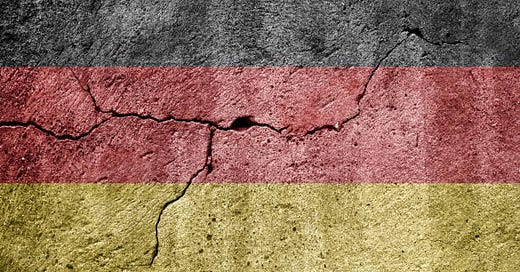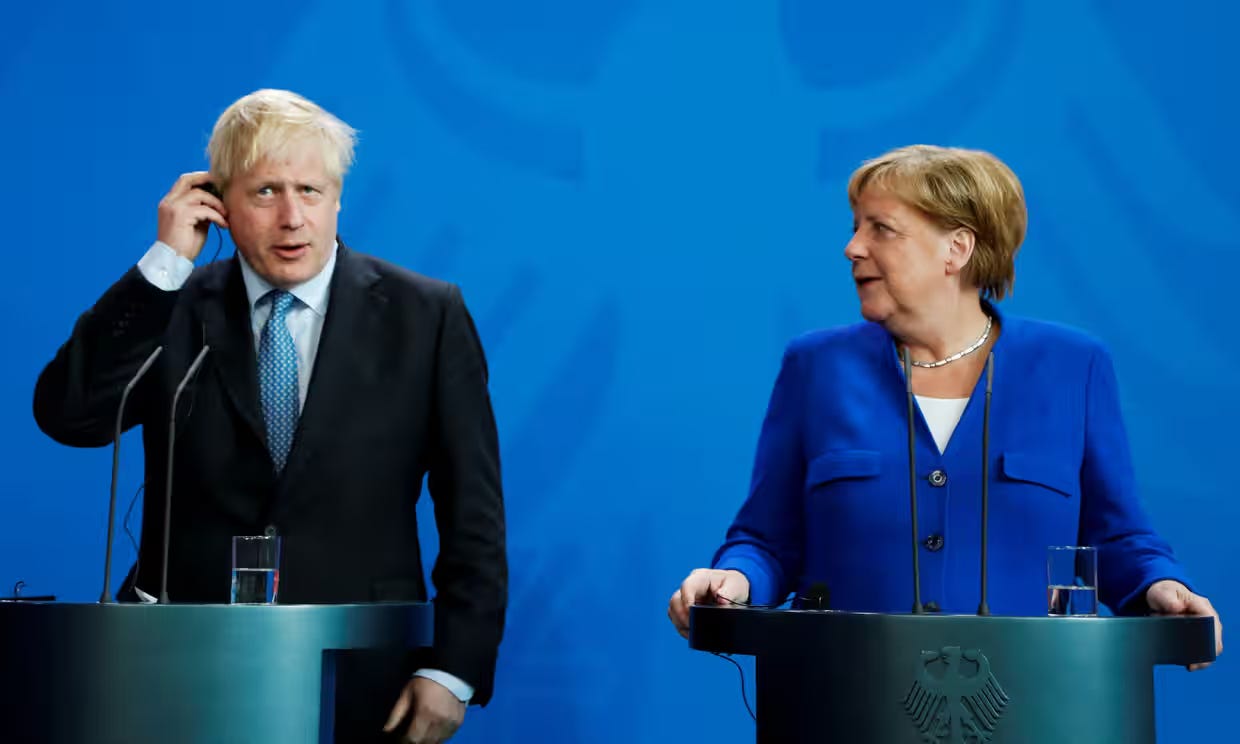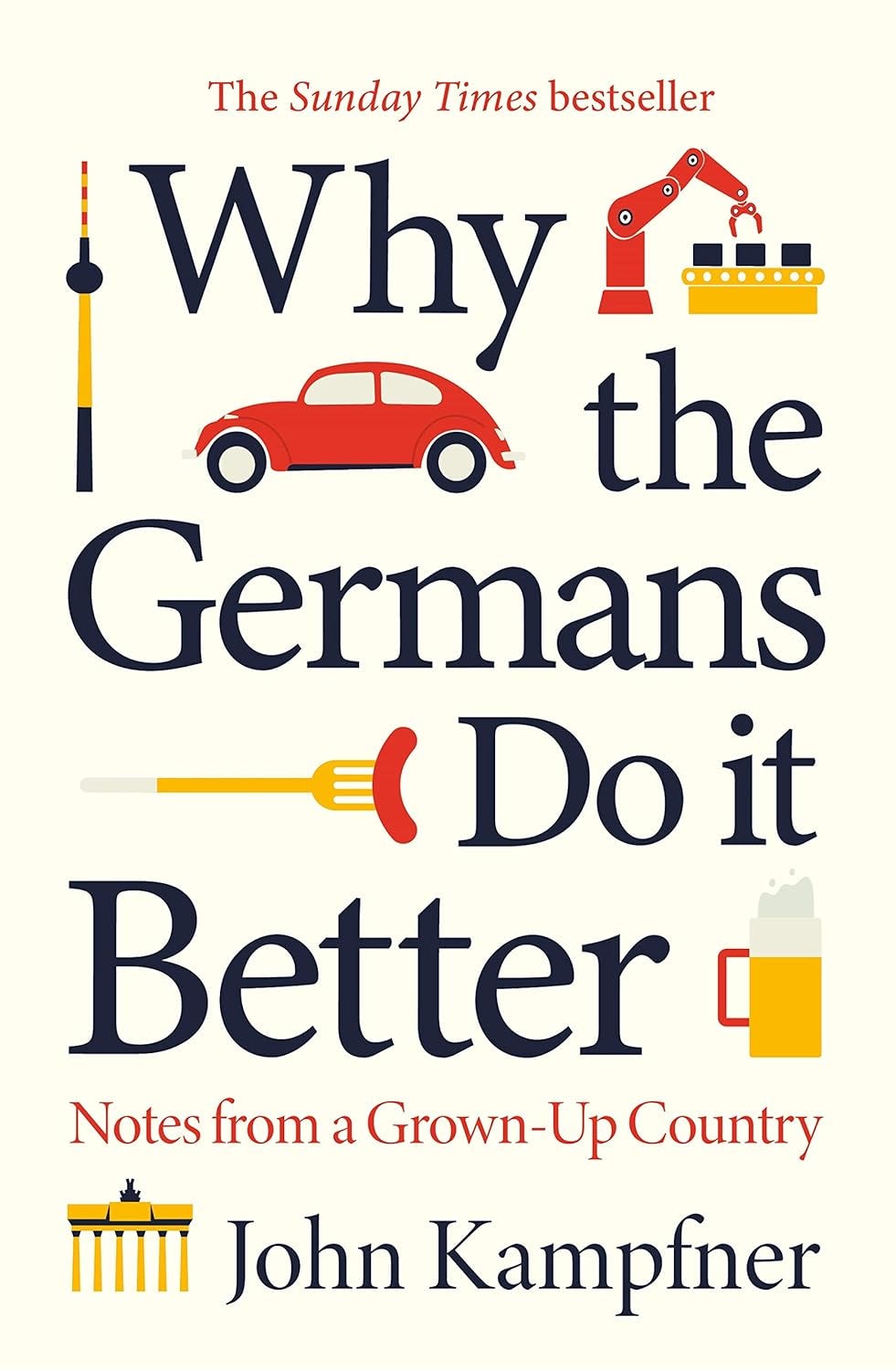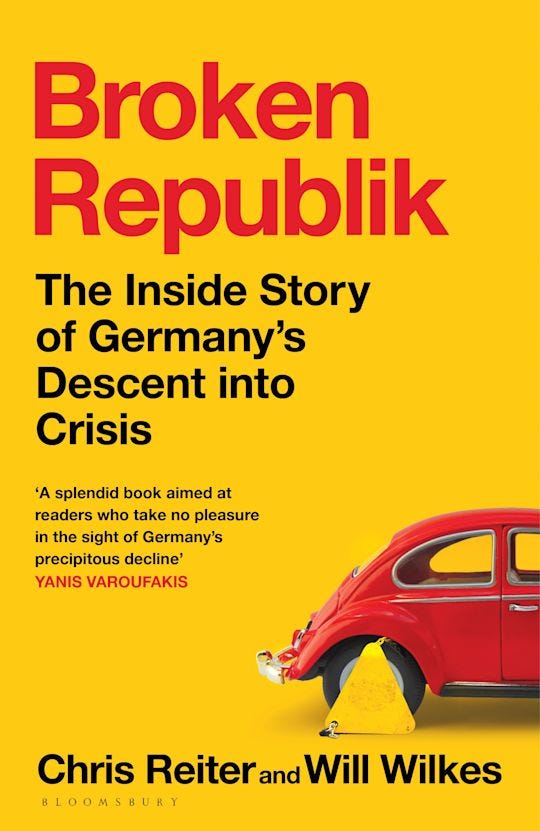From a City Upon a Hill to a House Built on Sand
How quickly Germany's international reputation has changed in recent years
Britain has a long history of looking to Germany. A habit of using the country as a yardstick against which to measure our own performances and achievements; from fields as varied as politics and the economy, down to football and behaviours around the swimming pool on package holidays.
This benchmarking of ourselves against Germany is something I have written about in many of my previous posts and the subject of a book I have been writing in my spare time over the past few years (any interested agents reading, do get in touch😉)
British attitudes to Germany have fluctuated wildly over the decades. Unsurprising given our countries’ shared histories of kinship and affinity, conflict and competition. Yet it’s fair to say that since the mid-2000s, British views of Germany have been increasingly warm, and the country used as a positive contrast to our own problems.
In 2016 German comedian, Jan Böhmermann, released a comical song and video called Be Nice! [Achtung Germans on the rise!] It is sung in the manner of a Rammstein song, with Böhmermann dressed like one of the band’s members in leather fetish gear. The video begins with an adaptation of the Guy Fawkes poem:
Remember Remember,
the 9th November,
broken glass, fire, and plot.
I know of no reason,
why our very own treason,
should ever be forgot.
The reference to Kristallnacht sets the tone of the piece, stressing the importance of not forgetting where nationalism can lead. The video then opens to a group of modern protesters intimidating immigrants on a bus. The crowd carry traditional Germanic racist placards stating things like ‘Wir sind das Volk’ (we are the people) as a young, brown child is dragged off the bus. But then, emerging from the soil, come the new Germans. A group of citizens dressed as cyclists, Jack Wolfskin and Birkenstock wearing ramblers, and hippies all singing ‘You are not the people, you are the past!’
Listing things the modern German state likes to think it stands for – liberalism, tolerance, multiculturism, their constitution, Dosenpfand[1] the song paints a picture of Germany as an archetypal modern state and example to others. A city upon a hill. A country that has moved past nationalism (‘We are proud of not being proud’), the crowd carry European, rather than German, flags. Knowing where such divisive views lead, Germany history should serve as a reminder to other countries flirting with populism:
‘We are here to remind you,
that we have once been stupid too!’
This knowledge of their past should also encourage modern Germans to be more assertive in defending their liberal principles against the forces of extremism and populism on the rise around the globe (including, again, in their own country); my favourite line is perhaps
‘We are no longer murderous vandals,
Be Nice!
Or we’ll come for you in socks and sandals!’
It’s a great little piece and can be viewed in the link below.
That the song is performed in English would suggest it was intended for an international audience, as well as liberal, educated Germans who speak the language fluently. A self portrait the latter group is keen to paint of itself for the world (though such an ideal is already looking naïve in light of the increasing vote share to ultra-nationalist AfD in elections since the song’s release).
Such views of Germany as a near perfect country from which Britain, and the rest of the world, could learn reached new heights in 2020. When Covid broke out, few other countries seemed to handle the response better. Particularly in Britain, many looked on with envy at the swift, calm reaction of the German government. A stark contrast to the dithering responses and shambolic, confusing communications from Britain’s leaders. This contrast was personified in the reassuring figure of Angela Merkel, against the crass, bumbling, gaffe-prone Boris Johnson (anyone remember his ‘let the bodies pile high’ comments as he dithered with a response, caught Covid himself, and broke every lockdown rule his own government set out?)
Never has the contrast between our two leaders been more acute. Photo from The Guardian
In was in 2020 that John Kampfner published his brilliant Why The Germans Do It Better highlighting how well Germany has handled key issues and crises in recent decades. The subtitle Notes From A Grown-Up Country, implying that Germany is a country from which Britain could learn a lot in terms of policy and crisis management.
From the global financial meltdown in 2009, subsequent Eurozone crises in 2010-12, and the explosion of migrants coming to Europe in 2015, the country seemed to weather every storm and come out smelling of roses. Frequently topping lists of best places to live and even ‘coolest’ destinations.
I loved Kampfner’s book. It was one of the things that finally inspired to start writing my own study, examining British attitudes to Germany through history, as well as the often forgotten influence and legacy the German lands have had on Britain.
Yet things move quickly these days in our current crazy times in which we live. What’s remarkable is how much has changed in the short time since both Böhmermann’s song and Kampfner’s book.
This year Will Wilkes and Chris Reiter published Broken Republik: The Inside Story of Germany’s Descent into Crisis. Also aimed heavily at a British readership (as many of the examples indicate) the work is indicative of just how much has changed in the past few years.
The authors highlight the plethora of issues facing modern Germany and how many of the very traits which earlier Britain and the world looked at with envy were misguided at best, if not outright self-destructive.
A lack of German patriotism or even self-identity. Pride in its post war development rested squarely on economic prowess, as this has started to falter, Germans have little patriotic narrative to fall back on. This gap is increasingly being filled once again with dangerous nationalism seen in the rise of the AfD.
An over reliance on the transatlantic alliance. Whilst this has been true for most European states, for Germany the relationship was existential. As America’s views on Europe have become indifferent at best, hostile at worse, Germany finds itself more lost than most.
Ever greater reliance on autocratic states - Russia for energy and China as an export market (especially for autos). Consequences of the former are now clear, the latter are emerging.
A reluctance, or seeming inability, to adapt to new digital technologies. (I’m currently travelling in South Africa, a country whose economy, education and infrastructure pails in comparison to Germany. Yet one thing that struck me is how much more technically advanced it seems in many areas. Especially in terms of data connectivity and digital payments. Even the smallest roadside vendor in remote areas I have visited takes cashless payment with my Google wallet, for the smallest amounts. Many shops and restaurants in major German cities still insist on cash or have a minimum spend to use card.)
All the things we in Britain and elsewhere looked at with envy over the past 20 years were perhaps an illusion. A house of cards which is quickly tumbling. Actions so extolled at the time – the country’s frugal approach to debt (including the Merkel’s self-imposed debt brake), the benevolent approach to the migrant crisis, robust export of manufactured goods - now seem incredibly short sighted.
I began writing my own book at the tail end of 2020, examining Britain’s views of Germany throughout history. This was the very point when we were viewing Germany as the ultimate beacon, the City upon a Hill.
As things have changed over the past few years as I’ve been contacting agents and publishers, I started to wonder whether my hypothesis needed a rewrite.
But of course, these changes have been occurring throughout history.
British views on Germany have always been in flux. A strange mixture of mistrust and envy, admiration and resentment. A model and a monster. This has fluctuated over the decades and centuries, but since the early 1800s, the country has remained a focus, a yardstick and a lens through which we reflect on our own successes and failures.
In the past decade or so we Brits may have gone from viewing Germany as the exemplar of all a country should do well, to one in which everything seems to be falling apart. Things are never as rosy or bleak as we imagine. In all cases, as is has been for so long, Germany remains our primary benchmark.
As an ardent Germanophile, I hope the country can make strides in a positive direction as it at least seems to be doing – increase its defence spending to rely less on others, invest more in digital infrastructure, address immigration in a fair and rational manner, and reduce its dependence on the export of petrol vehicles.
Britain and Europe will always look to Germany. Let’s hope they soon do so again for all the right reasons.
[1] Literally ‘can deposit’ - this is the small fee one pays when purchasing and bottles or cans. This pfand or deposit is then paid back when the bottles and cans are returned to a store to be reused or recycled. An amazingly simple way to encourage recycling and limit littering, and something I have never understood why we don’t have in Britain. Particularly as I walk past the various collections of beer cans and bottle left on street corners around Tooting where I live.








Really interesting!
I left Germany for the Low Countries in 2021 and have been watching these crises unfold from afar, wondering what happened.
My local train station here in the Netherlands gets a DB ICE from Berlin every so often on its way through to Amsterdam. I notice that it is almost always massively delayed whenever I coincide with it — a regular and sad reminder of the country’s decline.